Student Union
Arrests roil campuses nationwide ahead of graduation
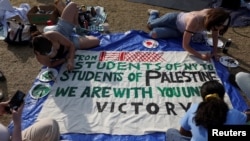
Protests are roiling college campuses nationwide as schools with graduation ceremonies next month face demands they cut financial ties to Israel because of the Israel-Hamas war.
Many campuses were largely quiet over the weekend but protesters on both sides of the issue shouted and shoved each other during dueling demonstrations Sunday at the University of California, Los Angeles.
About 275 people were arrested on Saturday at various campuses including Indiana University at Bloomington, Arizona State University and Washington University in St. Louis.
The number of arrests nationwide approached 900 since New York police removed a pro-Palestinian protest encampment at Columbia University and arrested more than 100 demonstrators on April 18.
Since then, students have dug in at dozens of pro-Palestinian encampments around the country, prompting a range of responses from administrators: arrests and criminal charges, student suspensions or simply continued pleas to leave.
The plight of students has become a central part of protests, with both the students and a growing number of faculty demanding amnesty for protesters. At issue is whether the suspensions and legal records will follow students through their adult lives.
Faculty members at universities in California, Georgia and Texas have initiated or passed largely symbolic votes of no confidence in their leadership.
White House national security spokesman John Kirby said President Joe Biden "knows that there are very strong feelings" but would leave managing the protests to local authorities.
"People should have the ability to air their views and to share their perspectives publicly but it has to be peaceful," Kirby said on ABC's "This Week."
In an interview that aired Sunday, Senate Republican Leader Mitch McConnell called it "a dangerous situation" and placed the responsibility with college administrators.
"There's also antisemitism, which is completely unacceptable. I've been shocked to see that in this country," he said on NBC's "Meet the Press."
How it started
Early protests at Columbia University in New York City sparked pro-Palestinian demonstrations across the country and students and administrators there have engaged in negotiations, the university said in a statement Saturday night.
Columbia has set a series of deadlines for protesters to leave the encampment — which they have missed — but bringing back police "at this time" would be counterproductive, the school wrote in an email to students.
On Sunday, students walked among dozens of colorful tents that continue to stand.
California
At the University of California, Los Angeles, police set up barricades before hundreds of demonstrators on both sides joined a growing crowd Sunday near where pro-Palestinian students have been staying around-the-clock in tents. Counter-protesters who organized a "Stand in Support of Jewish Students" rally said their goal was to "stand up against hatred and antisemitism."
Across town, the University of Southern California said it was open Sunday after being shut down a day earlier because of what the university called vandalism and disruptions.
USC drew criticism after refusing to allow the valedictorian, who has publicly supported the Palestinian cause, to make a commencement speech. Administrators then scrapped the keynote speech by filmmaker Jon M. Chu. Last week the school announced the cancelation of its main graduation event, a day after more than 90 protesters were arrested by police in riot gear.
In the northern part of the state, officials on Saturday ordered an "enforced hard closure" of California State Polytechnic University, Humboldt. Two halls remained occupied by pro-Palestinian demonstrators. The school said Sunday that the cost of the occupation — including damage done by "theft, vandalism and graffiti" — was estimated to be in the millions.
Missouri
Washington University in St. Louis locked some campus buildings and arrested protesters Saturday. Photos showed uniformed police attempting to remove masked protesters as others, also wearing masks, linked arms to thwart the efforts.
In a statement, the university said more than 100 people — including 23 students and four university employees — were arrested on suspicion of trespassing. Megan Green, president of the St. Louis Board of Aldermen, said in a social media post that she was present and the protest remained calm "until the police came in like an ambush."
Green Party presidential candidate Jill Stein said in a social media post that she and two of her campaign managers were among those arrested.
The university's statement defended the action and said protesters "did not have good intentions on our campus and that this demonstration had the potential to get out of control and become dangerous."
Some arrested also face charges of resisting arrest and assault, including for injuries to three police officers, the statement said. Those injuries include a severe concussion, a broken finger and a groin injury.
The Missouri chapter of the Council on American-Islamic Relations condemned the arrests as "heavy-handed."
Massachusetts
In Boston, police in riot gear cleared an encampment on the campus of Northeastern University on Saturday.
Massachusetts State Police said about 102 protesters were arrested and will be charged with trespassing and disorderly conduct.
Northeastern said in a statement that the demonstration, which began two days ago, had become "infiltrated by professional organizers" with no affiliation to the university and antisemitic slurs, including "kill the Jews," had been used.
The Huskies for a Free Palestine student group disputed the university's account, saying in a statement that counterprotesters were to blame for the slurs and no student protesters "repeated the disgusting hate speech."
Students at the Boston protest said a counterprotester attempted to instigate hate speech but insisted their event was peaceful.
U.S. campuses and the Israel-Hamas war
The nationwide campus protests began in response to Israel's offensive in Gaza. Hamas launched a deadly attack on southern Israel on Oct. 7, when militants killed about 1,200 people, most of them civilians, and took roughly 250 hostages. Vowing to stamp out Hamas, Israel launched an offensive in Gaza. In the ensuing war, Israel has killed more than 34,000 Palestinians in the Gaza Strip, according to the local health ministry.
Israel and its supporters have branded the university protests as antisemitic, while critics of Israel say it uses such allegations to silence opponents. Although some protesters have been caught on camera making antisemitic remarks or violent threats, organizers of the protests, some of whom are Jewish, say it is a peaceful movement aimed at defending Palestinian rights and protesting the war.
See all News Updates of the Day
- By Phil Mercer
Australia plans limits on international students
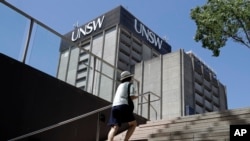
Australia says it will impose limits on the number of international students coming into the country to ease stress on housing and to reduce immigration.
The government in Canberra has said that international education programs, under which foreign students come to study in Australia, were fertile ground for immigration and visa fraud.
In 2023, official figures show that 787,000 international students studied in Australia, exceeding levels seen before the COVID-19 pandemic.
The Canberra government plans to cap the number of overseas students to ease stress on rental accommodation and to curb levels of immigration.
Senior government ministers have said caps for education would be part of a broader plan to manage migration, increase the availability of housing and to address skills shortages in the economy.
However, the university sector has insisted the proposals would damage Australia's global reputation as a welcoming, safe and world-class destination for students from other countries.
Education has been one of Australia’s most lucrative exports, but the left-leaning government in Canberra has said the international education sector, which includes many smaller private English language colleges, vocational and training institutions as well as larger universities, has been used as a way for unskilled migrants to stay in Australia.
Michael Wesley, the deputy vice chancellor at the University of Melbourne, told the Australian Broadcasting Corp. Tuesday that he hopes the government will target unscrupulous education providers.
“We welcome the crackdown on non-genuine education providers, which provide a backdoor into permanent residency for people who are not genuine students," Wesley said. "We are confident that all of our international students are genuine students and, so, we would hope that the impact of these visa caps will be at the non-genuine end of the education sector.”
Rental accommodation in many of Australia’s larger cities is often expensive and in short supply.
Analysts have said that surging prices are the result of years of underinvestment in affordable housing.
Education institutions would be required to build accommodations for their students if they wanted to exceed limits of the caps. Specific quotas for international students have not yet been made public.
The government in Canberra said it will change Australia’s Education Services for Overseas Students Act to give the education minister the authority to set limits on student enrolments for each education establishment, including specific courses or locations.
The majority of overseas students in Australia come from five countries: China, India, Nepal, the Philippines and Vietnam, according to government data. They contribute billions of dollars to the Australian economy.
Canada limits international student visas
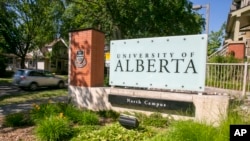
Saying the country has seen a massive spike in temporary immigrants – such as foreign workers – Canadian Prime Minister Justin Trudeau announced caps on international student visas.
Canada hosted more than 1 million international students in 2023, according to the Washington Post. That’s the same number as the United States, a country eight times its size. (April 2023)
Protests dwindle to tiny numbers, subtle defiant acts at US college graduations
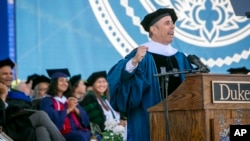
A tiny contingent of Duke University graduates opposed pro-Israel comedian Jerry Seinfeld speaking at their commencement in North Carolina Sunday, with about 30 of the 7,000 students leaving their seats and chanting "free Palestine" amid a mix of boos and cheers.
Some waved the red, green, black and white Palestinian flag. Seinfeld, whose decade-long namesake show became one of the most popular in U.S. television history and who continues to draw legions of fans to his Netflix specials and TV appearances such as "Comedians in Cars Getting Coffee," was there to receive an honorary doctorate from the university.
"After spending four years at what is considered one of the finest institutions of higher education in the world, they apparently feel that perhaps some light entertainment will get you all to the final realization, 'You know, I think I've really had enough of this place,'" Seinfeld said.
The stand-up turned actor and recent star, director and co-writer of the movie "Unfrosted," has publicly supported Israel since it invaded Gaza to dismantle Hamas after the organization attacked the country and killed some 1,200 people in southern Israel on Oct. 7. The ensuing war has killed nearly 35,000 people in Gaza, mostly women and children, according to Gaza's Health Ministry, which doesn't distinguish between civilians and combatants.
Students at campuses across the U.S. responded this spring by setting up encampments and calling for their schools to cut ties with Israel and businesses that support it. Students and others on campuses whom law enforcement authorities have identified as outside agitators have taken part in the protests from Columbia University in New York City to UCLA.
At the University of California, Berkeley, on Saturday, a small group of pro-Palestinian demonstrators waved flags and chanted during commencement and were escorted to the back of the stadium, according to the San Francisco Chronicle. There were no major counterprotests, but some attendees voiced frustration.
"I feel like they're ruining it for those of us who paid for tickets and came to show our pride for our graduates," said Annie Ramos, whose daughter is a student. "There's a time and a place, and this is not it."
The small student protest Sunday at Duke's graduation in Durham, North Carolina, was emblematic of campus events across the U.S. Sunday after weeks of student protests roiled U.S. campuses in recent weeks and resulted in nearly 2,900 arrests at 57 colleges and universities.
This weekend's commencement events remained largely peaceful.
At Emerson College in Boston, some students took off their graduation robes and left them on stage. Others emblazoned "free Palestine" on their mortar boards. One woman, staring at a camera broadcasting a livestream to the public, unzipped her robe to show a kaffiyeh, the black and white checkered scarf commonly worn by Palestinians, and flashed a watermelon painted on her hand. Both are symbols of solidarity with those living in the occupied territories.
Others displayed messages for a camera situated on stage, but the livestream quickly shifted to a different view, preventing them from being seen for long. Chants during some of the speeches were difficult to decipher.
Protests at Columbia University, where student uprisings inspired others at campuses across the country, led the school to cancel its main graduation ceremony in favor of smaller gatherings.
The University of Southern California told its valedictorian, who publicly backed Palestinians, that she could not deliver her keynote speech at its graduation ceremony because of security concerns. It later canceled its main graduation ceremony.
At Depaul University in Chicago, graduation is more than a month away. But as the academic year closes, school leaders said they had reached an "impasse" with the school's pro-Palestinian protesters, leaving the future of their encampment on the Chicago campus unclear.
The student-led DePaul Divestment Coalition, which is calling on the university to divest from economic interests tied to Israel, set up the encampment nearly two weeks ago. The group alleged university officials walked away from talks and tried to force students into signing an agreement, according to a student statement late Saturday.
- By VOA News
Students weigh in on how colleges can prepare undergrads for work
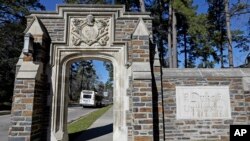
Inside Higher Ed surveyed undergraduates on the best way to prepare for the workforce.
One group of students in Oregon built a for-profit snowboarding business as part of their degree. Colleen Flaherty reports. (April 2024)
- By VOA News
Many African students are experiencing US visa rejections

In 2022, 71% of student visa applications from Western Africa were rejected.
Visa agents are not happy – and are finding ways to help applicants with paperwork and the interview. Maina Wururu reports for The PIE News. (April 2024)






